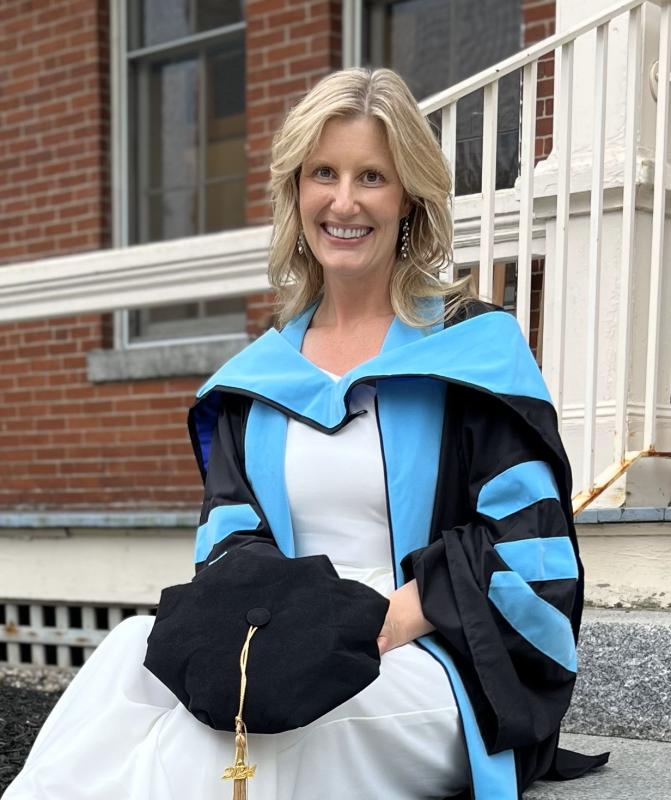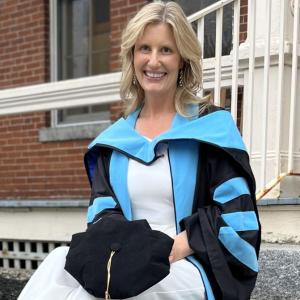Keep on learning
BRES Principal Shawna Kurr’s doctorate provides insight on education
Fri, 06/14/2024 - 8:30am
Even though she recently received a doctorate, Boothbay Region Elementary School (BRES) Principal Shawna Kurr chuckled at the idea of a terminal degree. Kurr, who graduated in May as a Doctor of Education from the University of New England, said she isn't done learning.
“‘Terminal’ seems so silly, you know?” she said. “... Especially in education, because there's always something new to learn or to get better at.”
Kurr’s research explored how Maine educators perceive teacher evaluation systems. She said evaluations in Maine public schools have been the same for decades, and research on it was just as old. Her work argues that current strategies, top-down mandates to drive reform, are not getting the desired results across the state.
According to Kurr, the most recent national reform, Race to the Top, established in 2012, operates on the premise that by holding educators more accountable for student outcomes through teacher evaluations, student achievement will rise. However, her dissertation reports that, over a decade later, Maine student test scores remain stagnant or lower.
“I have to actually put a rating on teachers, and I am not sure what purpose that serves,” she said. “... Assigning a summative rating doesn't increase motivation to change practice. It can also hurt a relationship. It can hurt culture. It can hurt growth mindset. And so there's a lot of reasons to not do an effectiveness rating for teachers. It's a complex topic that really hasn't been fleshed out on (if what we’re doing is) even effective.”
For her research, Kurr explored how teachers describe the purpose of evaluations, their interactions with them, and how they motivate or inhibit growth. To answer these questions, she gathered information from nine interviews with teachers from randomly selected schools across Maine. Her research reported teachers felt current evaluation systems are not as effective as intended, and they have minimal, if any, impact on motivation to enhance teachers’ practice. She said teachers largely thought evaluations were simply a checkbox.
“(Teachers felt) administrators are far too busy to engage in the process fully in a meaningful way,” Kurr said. “And, in some cases, teachers felt like they were too busy to engage in a meaningful way, (so) it became kind of a meaningless process that they had to go through.”
However, that doesn’t necessarily mean teachers reject oversight. In fact, Kurr was surprised to learn participants unanimously wanted administrators to be more involved, but in more substantial ways. Overall, her research reported teachers are self-motivated to improve and wanted meaningful feedback. However, the current systems to get there appear to be limited.
“I had a few teachers who had 20 to 40 years experience, and they felt like they're constantly improving their practice, but it has absolutely nothing to do with the evaluation process, that actually doesn't improve their practice,” she said.
Instead, Kurr said professional collaborations were a leading driver for growth. The question then became how those communities could be leveraged by schools to help teachers without creating more hoops to jump through.
In her own experience, Kurr said one major benefit of the doctorate program was making those kinds of professional connections. A significant reason she chose the program was because it is based in New England. Now, she has a new network of educators dealing with similar issues who she can reach out to for help, and she wants to encourage developing such professional networks at BRES.
She also proposed applying lessons she learned in her research to create systems that support and motivate teachers’ growth. She said at BRES teachers already set goals and self-evaluate, and administrator evaluations are more ongoing than one high-pressure session. However, she wants to decrease the emphasis on ratings and put more on setting and meeting teachers’ goals. With almost two decades of experience as a school administrator, Kurr said she is familiar with multiple systems and is now armed with more information on their effectiveness to better enact change.
However, even supported by her experience, a doctorate is hard. She said she completed it over long nights and weekends, leaving weekdays and spare nights for her job as principal, which was admittedly difficult on her family. As for the BRES staff, she said some are now curious about pursuing their own academic goals but may be hesitant. She hopes her experience demonstrates it’s possible to balance a successful career and advanced education.
“If you have the grit and the stamina and a supportive family, you can do this. You learn as you go," she said. She later added, “We're in the business of education, and if we're not pushing ourselves to reach to the highest levels of education that we possibly can, I feel like we're doing a disservice to our schools, to our communities, and to our students.”
Event Date
Standard Post
























